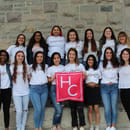There is no guide to life after sexual assault. There’s no manual on what to do or how to heal. There’s no one in the world who will be able to tell you how to put yourself back together. Sometimes it just feels like an empty abyss with no end in sight. You hit rock bottom but somehow keep on falling.
I didn’t know how to dig myself out; it felt as if every move I made was wrong. I was caught in a riptide that was pulling me out further and each conscious effort I made to get back to shore was met with the cold embrace of reality. Each breath I took was tense as if I didn’t know when I’d surface again. When I looked up I could see the rest of the world turning, everyone but me. I felt left behind, and I didn’t know who to blame but myself. It was as if I could see my friends soaking in the sun and embracing the warmth of life, but I was still stuck in cold and unforgiving waters with the weight of the world holding me down.
No one ever expects it to be them, even with the horde of statistics that every college-age woman has come to know like the back of her hand. I felt childish. I felt naive. I felt stupid. How could I let this happen? What could I have done differently? The world is still spinning for everyone but me, it must be my fault. Who else is there to blame? Every waking moment I was met with a pang of guilt. Guilty for staying in bed all day. Guilty for closing myself off from others. Guilty for every single feeling that I felt because I thought it was my fault in the first place.
For the first couple of weeks, I didn’t know how to heal. To be honest, I didn’t even know that I needed to heal. I thought that because I didn’t remember anything it must be fine, but I think I was just trying to hide from the fact that I would never know for sure. I would never get any closure. I was kept awake for nights on end with nothing to think about except for that gap that filled my mind. The absence of memories, of coherent thoughts, of everything. For weeks it was just me and that gaping hole. There was not a moment where the thought of it was far away. One small tug was all it took and I came crumbling back down.
I was afraid to talk about it with anyone. I didn’t know who to talk to. I feared the stigma surrounding sexual assault and my peers treating me differently. Every ounce of my being wanted to sweep it all away and pretend like nothing happened at all. I wanted to reminisce on the gap in my memory and not be flooded with the “what if” feelings and the constant second-guessing. I wanted to never address it again and move on with the rest of my life without another thought.
The way I coped was the opposite of healing. I pushed aside every feeling that I felt to the point where I nearly convinced myself that nothing had happened in the first place. I was so afraid that working through my emotions would break me down even further. Whenever I took a moment to myself, I felt guilty for the laundry list of things I wasn’t doing. Why was I wasting time feeling bad for myself when I had so many other things to do? Even at night, I spent the time before I fell asleep making mental lists of everything I had to do, to not leave myself with an unoccupied mind and thoughts that could race so far I wouldn’t be able to reign them back in.
I was living in fear of the breakdown that I was sure would one day ensue. I was sure that if I let myself think about it for too long that there would come a point where it would be the only thing I thought about again. It was really hard to let that fear dissipate. I felt like I was losing control, but what I didn’t realize was that by giving myself the time and space to heal I was actually gaining my control back. It took a lot to admit to myself that I wasn’t okay, but once I did I felt like a new person. It felt like I was finally able to take a deep breath again after holding it in for so long.
Once I finally realized that I couldn’t change the past, it was the turning point for me. I had to forgive myself in order to move on. I had to forgive myself for ever believing that it was my fault. I had to forgive myself for not giving myself the environment necessary to heal. I had to forgive myself for pushing aside my feelings, and for not listening to what my mind and body needed. This doesn’t in any way mean that my life is perfect or my journey is over because I know that it probably will never be, but I am proud of the progress I have made and that I’ve finally given myself what I really needed.



